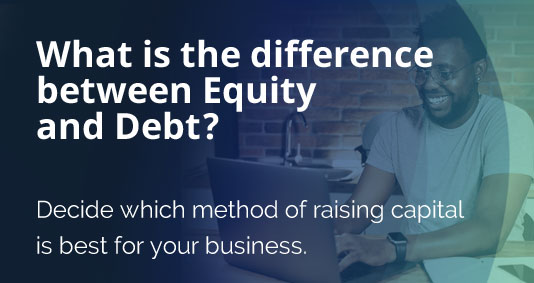
What is the difference between Equity and Debt?
Companies looking to raise capital can choose equity financing or debt financing, or a combination of both.

Companies looking to raise capital can choose equity financing or debt financing, or a combination of both.
We have asked our partner, 365 Business Finance, to define financial terms to help small to medium sized enterprises (SMEs) navigate the financial world – especially SME business owners who are new to funding.
In this blog, we outline what equity and debt financing are, and how these two finance options compare.
Companies looking to raise capital can choose equity financing or debt financing, or a combination of both. The choice usually comes down to accessibility and cash flow, and the owner's tolerance for relinquishing some control of the business. The balance of debt and equity that comprises a company's financing is known as its debt-to-equity-ratio.
Companies sell some of their equity in order to raise capital. This is a good way to generate funds for new initiatives or necessary investment. The money will not need to be repaid but part of the business will be owned by someone else, and they will have input into decision making.
No payments and interest charges will be due with this type of financing. Both the owners and investors have an interest in continuing business success and return on investment. This is assisted by the additional capital available for investment and the lack of financial burden.
However, some view the relinquishment of a percentage of the company as a significant disadvantage. Additionally, there is now another entity who must be consulted before decisions and action are taken, and profits will now need to be shared by another party. If you want to remove an investor it will likely cost you more to do so than the original investment amount.
If a company takes out a loan, which is repayable with interest, this is known as debt financing. This type of financing might place limitations on company activities that restrict them to the core business area only. A low debt-to-equity ratio is favourable to firms that may want to take out more debt financing.
Unlike equity financing, the entity providing the loan doesn't hold any control over the business and after the debt is settled, the relationship ends. Loan repayments will not increase and so forecasting is easier. The company will also be able to deduct tax on the basis of the interest paid.
The key factor to consider is that taking out a loan is a gamble on future solvency and could become a burden if growth is not as expected or there is an economic downturn. It might also be impossible to agree a loan in the first place without some guarantee in the form of personal assets.
Equity Financing
A common method is to allow others to buy shares in the business. Smaller companies sell shares to private investors in return for equity. Larger businesses may go public and sell stock shares. This is a quick method for generating cash quickly but is obviously not available to all businesses.
Alternatively, a young company not yet in a position to sell stock or shares may look for a venture capitalist. These investors will expect a share of ownership plus a say in future business direction. It should be expected that they will cash in their ownership if, and when, the company is acquired or goes public.
Debt Financing
Usually this will be in the form of a bank or commercial loan. Long term debt financing could be in the form of a secured or unsecured business loan or an equipment loan.
There will be an agreement for the investment loan, or ‘principle’, to be paid back to the lender by a certain date and should the company enter bankruptcy, the lender will have more rights to the assets than the shareholders of the company.
It all depends on where the business is currently, and where the business plans to be in the future. Credit scores and solvency ratings are considered when applying for loans, and company accounts are usually taken into consideration when looking for equity financing. If you are in a strong financial position, it is usually much easier to raise funds cheaply or for less equity as there’s less risk involved. There are several options available to all businesses looking to raise funding; businesses need to carefully consider what method suits their situation.
365 Business Finance are a financial provider that offer merchant cash advances to small and medium-sized businesses across the United Kingdom. A merchant cash advance is designed as a quick way for businesses that accept credit and/or debit cards to raise capital without the need for a bank loan or hefty overdraft.